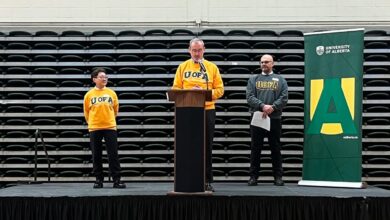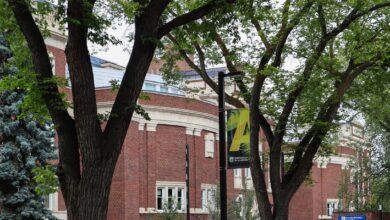SU bill criticized by Aboriginal students repealed
A new bill passed in Students' Council reverses the changes made by a controversial piece of legislation passed last year
 Richard Bagan
Richard BaganAfter an uproar from Aboriginal student representatives, Students’ Council passed a new bill replacing a previous one that “ostracized” an Aboriginal relations committee from all other council committees.
The new legislation, Bill 3, will unify two types of council committees into a single type, termed “standing committees.” The bill will also give committees control to alter their own membership and allow committees to create positions for unelected student representatives. The bill unanimously passed its second reading on August 21.
Native studies councillor Nathan Sunday and science councillor Katherine Belcourt both said they were happy with the amalgamation, which they said restores an unfair separation of the Aboriginal Relations and Reconciliation Committee (ARRC) by Bill 5.
When Bill 5 passed in January, it introduced the creation of two new committee categories, separating those that consisted of only elected council members into “legislative committees” and those whose membership could be opened to unelected student representatives termed “oversight committees.”
Oversight committees were also made to be more easily disassembled as it did not require discussion at the council level.
Many Aboriginal student representatives disapproved of Bill 5 because it separated the newly created ARRC as an “oversight committee” away from all other council committees that were deemed “legislative.”
Sunday said this previous change had no bearing on any committee’s power to put forth recommendations to council, but that the separation existed purely to “ostracize” Aboriginal student voices.
“This is what my problem was [with the original change],” Sunday said. “If the committees all had the same power, why do we have to split them into two groups? Especially when it was clear that students didn’t want that.”
Students’ Union president Reed Larsen said he felt Bill 5 was passed before it was ready, and like Sunday and Belcourt, he’s happy with the changes the new Bill 3 has introduced.
“I thought [Bill 5] needed more time. It should have been a more consensus-based decision,” he said. “If we can’t have a unified council on it, then it wasn’t quite ready. And obviously, it wasn’t, because we revisited it again.”
Aboriginal students petitioned against Bill 5
Sunday had been an opponent of the original Bill 5 since it was first introduced to council. While consulting with students, he said most wanted a “real commitment” from the SU towards reconciliation, but that separating ARRC from all other committees only functions to “ostracize” Aboriginal students.
“Setting aside ARRC as different from the other committees is not a reconciliation approach,” Sunday said. “It is ostracizing Aboriginal students and making them this exotic other that cannot be in the same category as the other committees.”
After the passing of Bill 5, Aboriginal Student Council petitioned the Students’ Council to repeal the bill. Belcourt, who led the initiative, said the petition gathered over 500 signatures from both Aboriginal and non-Aboriginal students.
Despite protest from Aboriginal student representatives, Sunday said many councillors at the time supported Bill 5, saying that the separation was needed because “legislative committees” shouldn’t have positions for non-elected students.
During the initial passing of Bill 5 in January, education councillor Jimmy Thibaudeau argued that allowing “oversight committees” to be more easily assembled would encourage more minority students to form their own committees.
“What I’m hoping for by [separating legislative and oversight committees is] we’ll be able to see [more] committees similar in scope and in nature to ARRC,” Thibaudeau said at the time. “As I’m sure there will be in order to help meet [the needs of] other marginalized groups on campus.”
However, Sunday said having non-elected student-at-large positions is important for students and increases the committee’s accountability towards the larger student population. Belcourt added that allowing committees to be too easily assembled and disassembled can strip them of their power.
“I don’t think it’s meaningful to have committees that you can just make on a whim and disassemble when it’s convenient [for council],” Belcourt said. “That’s very much a one-sided relationship.”
Moving towards reconciliation
Both Sunday and Belcourt said what facilitated the replacement of Bill 5 has been in part an introduction of new council members. Sunday said that in the past, many councillors had been in position for an extended period and were no longer receptive to change or new ideas.
“When we brought forward our concerns [about Bill 5] to council this year, many more people agreed with us that this needed to be addressed,” Sunday said. “I think there’s much more openness to dialogue and things are not as hostile as they were last year.”
Belcourt added that Aboriginal student representation has also increased this year with the addition of several new Aboriginal councillors, including herself.
“[The passing of Bill 5] really encouraged me to get involved in Students’ Council because if I’m a councillor, I can’t be ignored,” Belcourt said.
Now that Bill 5 has been repealed, Sunday and Belcourt said ARRC will switch their attention to the development of a 60-point recommendation document for the SU, focusing on tangible reconciliation goals. ARRC will be hosting a town hall on September 27 to gather student opinion on the document before presenting it to council in October.
“I’m really happy [council was able to] come together and move forward [in replacing Bill 5],” Sunday said. “Now that this is behind us we can really focus on our work and in keeping the SU and Students’ Council accountable on their reconciliation goals.”




